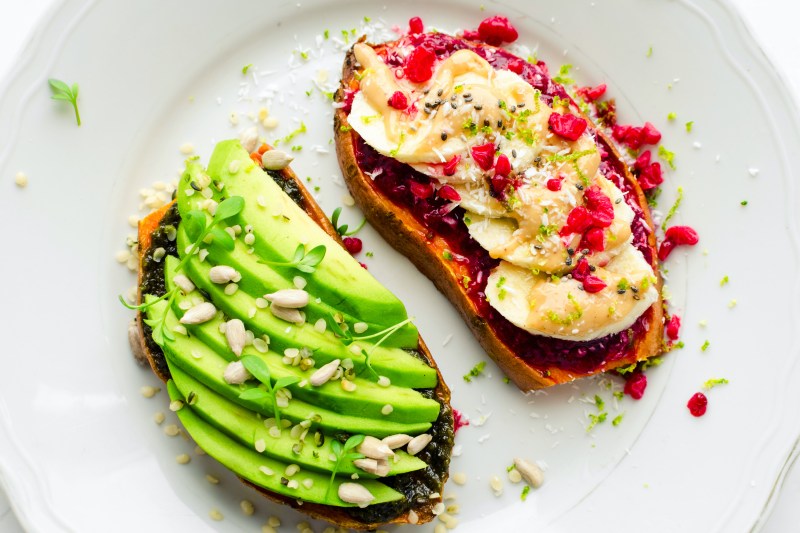They say that breakfast is the most important meal of the day for a reason. As a nutritionist, I always advise my clients to start their day off right with a nutrient-dense breakfast that they can both enjoy and will give them a boost. While protein and healthy fats are essential for every meal, having healthy carbs for breakfast is especially important.
Complex carbohydrates will help with your energy levels throughout the day and can aid in balancing blood sugar as well. Keep reading to learn the ideal carb sources to include in your breakfast!
What are the benefits of having carbs at breakfast?

Sustained energy
Carbs provide your body with glucose, which is the primary source of energy for your brain and muscles. Starting your day with carbs helps ensure you have the energy needed to power through the morning, keeping you focused and productive.
Improved mood
Carbohydrates help boost serotonin levels, a neurotransmitter that regulates mood. In fact, MIT News states that “when you stop eating carbohydrates, your brain stops regulating serotonin, a chemical that elevates mood and suppresses appetite.”
Eating carbs at breakfast can promote a positive, calm feeling and help reduce irritability, setting a more balanced tone for the day.
Balanced blood sugar
When paired with protein and healthy fats, carbs help stabilize blood sugar levels. This prevents energy crashes and helps you maintain consistent energy throughout the morning.
How many grams of carbs should you have for breakfast?

The ideal amount of carbs for your breakfast depends on what health goals you have set for yourself. If you primarily lift, aim for 30 to 50 grams of carbs at breakfast to fuel muscle recovery and provide energy for strength training. If you are more focused on endurance, 50 to 70 grams of carbs can support sustained energy during longer workouts or runs.
Men who just want to get through the day without a plan for a workout session can stick to 30 to 40 grams of carbs to maintain steady energy without spiking blood sugar. Overall, the exact amount depends on individual goals and activity levels, and you may find that on certain days, you want your breakfast to be more carb-heavy than others. Always try to pair carbs with protein and healthy fats to help optimize energy, muscle function, and overall well-being throughout the day.
9 healthy carbs to include in the first meal of your day

- Oats: Oats are a fantastic source of fiber and complex carbohydrates, providing steady energy throughout the morning. They’re rich in beta-glucan, which supports heart health.
- Sweet potatoes: Packed with vitamins, minerals, and fiber, sweet potatoes offer slow-digesting carbs that provide sustained energy and promote good digestion.
- Whole-grain toast: Whole grains like whole-wheat bread are rich in fiber, which helps stabilize blood sugar levels and keeps you full longer.
- Quinoa: A complete protein and fiber-rich grain, quinoa offers balanced energy and helps muscle recovery.
- Brown rice: Brown rice provides complex carbs and fiber, helping you feel full and energized throughout the morning.
- Berries: Berries like blueberries, strawberries, and raspberries are low in calories and high in fiber, vitamins, and antioxidants.
- Bananas: Bananas are rich in potassium and natural sugars, offering a quick yet lasting energy boost.
- Lentils: Lentils are packed with fiber and protein, promoting fullness and stabilizing blood sugar levels.
- Apples: Apples provide fiber and natural sugars, offering energy without the crash, along with a dose of vitamin C.
Are there any downsides to a carb-free breakfast?

A carb-free breakfast isn’t necessarily ideal because it may lead to quick energy depletion, as carbs are the body’s primary fuel source. Without them, you might experience fatigue, irritability, or trouble focusing throughout the morning. Additionally, as we mentioned before, carbs help boost serotonin levels, which regulate mood, so skipping them could affect your emotional state.
A lack of carbs can also result in reduced workout performance, especially if you are about to go for a run or bike ride or engage in other high-intensity exercises. While a low-carb breakfast can work for some, pairing protein and healthy fats with carbs is the best option for minimal energy crashes throughout the day.
Other tips for creating a nutritious breakfast

To create a nutritious breakfast, consider implementing the following tips:
- Focus on a balanced combination of protein, healthy fats, and fiber-rich carbs.
- Start with protein sources like eggs, Greek yogurt, or plant-based options such as tofu or lentils to support muscle repair and keep you full.
- Add healthy fats like avocado, nuts, or seeds to promote heart health and maintain steady energy.
- Include fiber-rich carbs like whole grains, fruits, or vegetables to regulate blood sugar and digestion.
- Stay hydrated by drinking water or herbal tea alongside your meal.
- Avoid sugary cereals or pastries, which can lead to energy crashes.
- Aim for a colorful, nutrient-dense plate.
Frequently asked questions

What are good carbs to eat with eggs?
Good carbs to pair with eggs include sweet potatoes, oats, quinoa, or avocado on whole-grain bread. Fruits like berries, bananas, or oranges could also add natural sweetness and fiber. These options provide sustained energy, making them great for breakfast or post-workout meals to support muscle recovery and performance.
Is it better to eat protein or carbs for breakfast?
It’s ideal to include both protein and carbs at breakfast. Protein helps build and repair muscles, keeps you full, and stabilizes blood sugar. Carbs provide energy for the day ahead. A balanced breakfast with both nutrients — like oatmeal with protein powder — offers sustained energy and supports overall health.
Why should you not eat carbs for breakfast?
Avoiding carbs for breakfast may cause energy crashes later, as they provide quick fuel. However, if consumed alone without protein or healthy fats, carbs can lead to blood sugar spikes and crashes. It’s generally better to combine carbs with protein and healthy fats for sustained energy and balanced nutrition.




